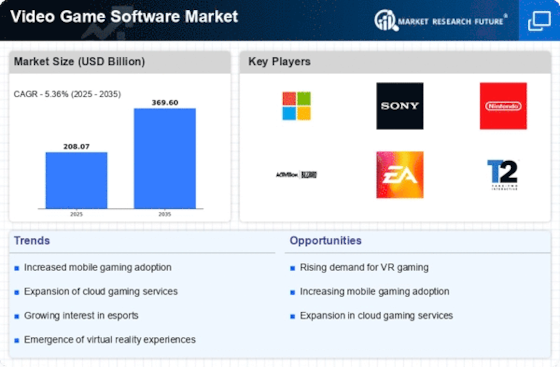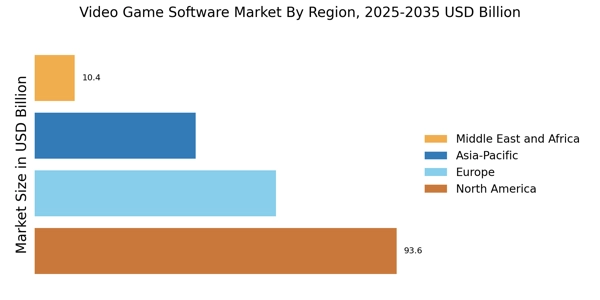Diverse Gaming Platforms
The Video Game Software Market is characterized by the proliferation of diverse gaming platforms, which significantly influences consumer preferences and purchasing behavior. With the advent of consoles, PCs, and mobile devices, developers are compelled to create software that caters to various platforms. This diversification allows for a broader reach, as different demographics engage with gaming in unique ways. For example, mobile gaming has surged, accounting for nearly 50% of the total gaming revenue in recent years. This trend suggests that developers must adapt their strategies to optimize software for mobile experiences while maintaining quality across other platforms. As a result, the industry is witnessing an increase in cross-platform play, which enhances user engagement and retention. The ability to play across multiple devices is likely to become a standard expectation among consumers, further driving growth in the Video Game Software Market.
Technological Advancements
The Video Game Software Market is experiencing rapid technological advancements that are reshaping the landscape of gaming. Innovations in graphics, artificial intelligence, and virtual reality are enhancing user experiences and driving demand for new software. For instance, the integration of AI in game development allows for more dynamic and responsive gameplay, which appeals to a broader audience. As of 2025, the market is projected to reach a valuation of approximately 200 billion dollars, indicating a robust growth trajectory fueled by these advancements. Furthermore, the rise of cloud gaming platforms is enabling players to access high-quality games without the need for expensive hardware, thus expanding the potential consumer base. This technological evolution not only attracts new players but also encourages existing gamers to invest in the latest software offerings.
Evolving Consumer Preferences
The Video Game Software Market is undergoing a transformation driven by evolving consumer preferences, which are reshaping the types of games being developed and marketed. Today's gamers are seeking more immersive and interactive experiences, often favoring titles that offer rich narratives and complex gameplay mechanics. This shift is evident in the rising popularity of role-playing games and open-world titles, which provide players with the freedom to explore and engage with the game world. Additionally, there is a growing demand for socially conscious themes and representation within games, reflecting broader societal trends. As of 2025, it is estimated that nearly 70% of gamers prioritize story-driven content, indicating a significant shift in market dynamics. Developers are thus compelled to adapt their offerings to align with these preferences, ensuring that the Video Game Software Market remains responsive to the desires of its audience.
Increased Investment in Game Development
The Video Game Software Market is witnessing a surge in investment directed towards game development, which is pivotal for fostering innovation and creativity. As the demand for high-quality gaming experiences escalates, developers are allocating more resources to create immersive and engaging content. In 2025, it is estimated that investment in game development will exceed 10 billion dollars, reflecting a commitment to enhancing gameplay and storytelling. This influx of capital enables studios to hire top talent, invest in cutting-edge technology, and explore new genres and formats. Moreover, the rise of independent game developers is contributing to a more diverse array of offerings, appealing to niche markets and fostering a culture of experimentation. This increased investment not only enriches the gaming landscape but also stimulates competition, ultimately benefiting consumers with a wider selection of innovative software.
Growing Popularity of Streaming and Content Creation
The Video Game Software Market is significantly influenced by the growing popularity of streaming and content creation platforms. As more gamers engage in streaming their gameplay on platforms like Twitch and YouTube, there is a corresponding increase in interest for games that are visually appealing and entertaining to watch. This trend has led to a symbiotic relationship between game developers and content creators, where successful games often gain traction through streaming. In 2025, it is projected that over 30% of gamers will actively participate in content creation, which in turn drives sales and engagement for specific titles. Developers are increasingly recognizing the importance of creating games that not only provide enjoyable experiences but also lend themselves well to streaming. This shift in focus is likely to continue shaping the Video Game Software Market, as the lines between gaming and entertainment become increasingly blurred.

















